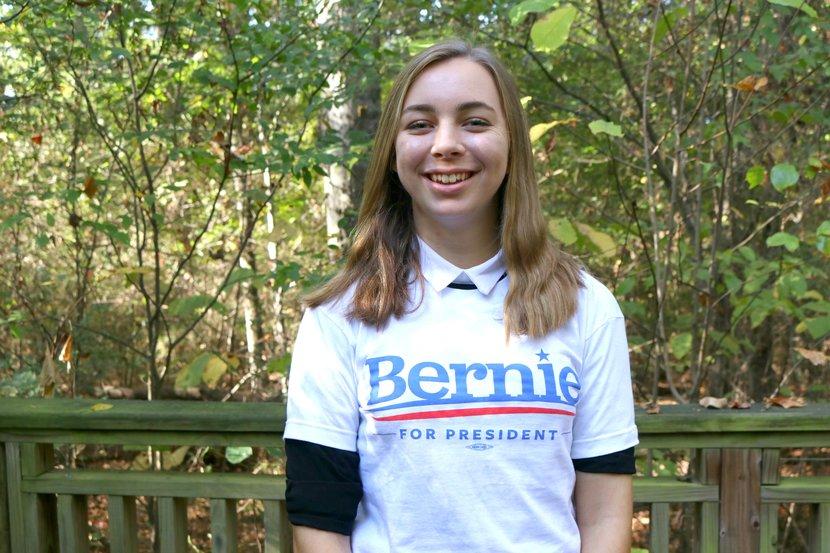Agreeing to disagree
In a time of political turmoil, some call for civility
In junior Emily O’Connell’s household, an addendum might be made to the common phrase “Don’t bring politics to the dinner table” — or out in public. During what started as a pleasant dinner out, the O’Connells’ night ended after some uninvited guests made themselves known.
The topic of the night was the recent release of a 2005 Access Hollywood video, in which Donald Trump describes his own behavior towards women in terms that reminded many of sexual assault.
“We were talking about how, in a male-dominated society, people really need to understand when no means no,” O’Connell said.
They were reminded that no conversation is private when a group of college boys sitting nearby overheard them and chimed in by making loud rape jokes and obscene gestures at their family.
“It was really uncomfortable, so we left. That kind of ruined the night for us,” O’Connell said.
The Silent Treatment
This wasn’t an isolated incident. Since moving from the famously democratic state of New York to the historically more conservative Mid-South three years ago, O’Connell has been exposed to a drastically different political climate than she was used to.
“When I mention women’s rights and racial equality, I’ll get eyerolls,” O’Connell said. “I learned that I couldn’t speak as openly about my beliefs as I could in New York because I would get backlash or some kind of verbal disagreement.”
Since moving to Tennessee, O’Connell, a self-described liberal, has found that people don’t share her same beliefs.
“It makes me feel like I want to shrink back into a persona where I don’t speak at all,” O’Connell said. “I don’t really voice my opinions as much anymore.”
Even in places like school, civility is not guaranteed when it comes to expressing seemingly controversial opinions. Students are a part of a climate that sometimes makes them unwilling to express any opinions that are outside of the norm.
They are not alone. According to Pew Research Center, 38 percent of Democrats and 43 percent of Republicans view the opposing party negatively, and those who have more unfavorable views of the opposite party are more likely to be politically engaged. As these numbers continue to grow, this climate will likely continue to worsen.
Google “avoiding political discussions,” and it returns over 34 million results. That’s over 34 million options for people who are actively trying to avoid speaking about politics.
“People are oppressed when they speak about their beliefs and forward their agendas,” O’Connell said. “There’s this atmosphere that you shouldn’t speak out and that you should keep your opinions to yourself.”
With the November election right around the corner, this has become more true than ever. Both candidates have polarized their audiences in a way that others haven’t in the past, causing turmoil in discussions in Washington and at home.
As a result, many students have made the choice to keep their political beliefs to themselves. Senior Mimi McCarroll is one of those students.
“I don’t like to share my political beliefs because I feel that, once I say something, people are immediately going to tag that on me,” McCarroll said. “I’ve seen it happen to other people in our grade, and I think it negatively impacts them. Everyone pins them to this certain stereotype, and I don’t want that to happen to me.”
Senior Britney Pepper has chosen to stay silent as well. While proud of her own beliefs, she does not express them outside of her house unless directly asked, in order to avoid conflict.
Pepper, like many others, associates political discussions with polarization and yelling. She has found that silence is often the easiest solution to maintaining a sense of civility.
“At school there are people who are more outspoken than me, so I prefer not to talk about it,” Pepper said. “Let’s just agree to disagree.”
Speaking Up
Teenagers struggling with feeling comfortable politically might do well to heed the advice of their elders.
Collierville Mayor Stan Joyner Jr. has been involved with local government since 1999, when he was elected to the Collierville Board of Mayor and Alder-
man. He has been involved in politics as long as the class of 2017 has been alive. He is currently serving his second term as mayor and campaigning for a third.
While Mr. Joyner’s position is non-partisan, meaning that he is not aligned with any political party, he recognizes that being politically active often leads to turmoil.
“Anytime you’re making decisions for residents, neighborhoods, neighbors, somebody is going to be happy and somebody is not going to be happy,” Mr. Joyner said. “I’m sure I’ve been criticized because I’ve voted for something that this person was against, but I’ve never taken it personally, unless the attack was personal.”
His method of dealing with criticism is to remember that he is remaining true to himself and his beliefs.
“You have to be true to yourself, first and foremost. That person you get up to and look in the mirror at every morning,” Mr. Joyner said. “You’ve got to say, ‘I’m staring at somebody who is genuine, somebody who is not putting on an act, somebody who is the way they are today, tomorrow, yesterday.’”
Born in the 1950s and growing up in the 1960s has made Mr. Joyner more than familiar with political movements and the changes they can bring, but he recognizes that the current climate can make difficult for young people to speak up.
“I see what young folks are facing today. It’s a never-ending battle,” Mr. Joyner said. “It’s not easy, but it’s something that you have to do. But, there are ways that you can do it, and I think one of the best ways is to be informed about the issues.”
In addition to making sure they are well-versed on the issues of the day, Mr. Joyner encourages students to register to vote as soon as they are able.
“Like the old saying says, if you’re going to complain, you’ve got to go vote. If you’re not going to vote, don’t complain,” Mr. Joyner said. “We don’t live in a utopia where we are all going to be happy. That’s the reason why you have to get involved.”











